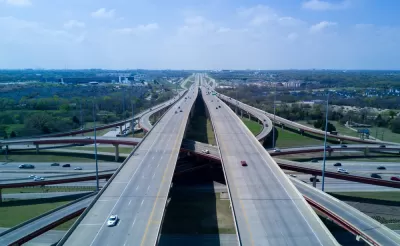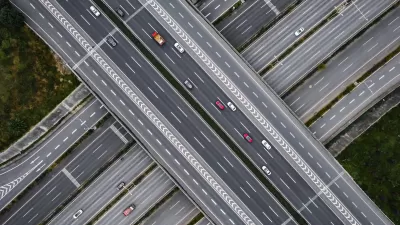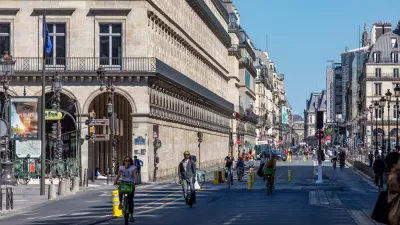Banning cars will not be effective as long as U.S. cities continue to prioritize transportation systems where mobility is dependent on driving.

Culdesac Tempe is a new Arizona development where cars will be banned—a strategy to encourage less driving, but one that does not address the broader issues, writes Joseph W. Kane. "Rather than focusing on an outright ban on cars, we need to make it easier for more people to live in places where shorter trips are the norm, and driving across an inefficient and inequitable built environment isn’t always necessary."
Culdesac Tempe’s vision is commendable, says Kane, but sustainability within the development will not change the fact that people still need to drive to get to work, shopping, school, and other destinations in the metropolitan Phoenix area.
Transportation systems too often privilege cars, and the car-centric landscapes of many American cities are reflected in trends in recent years such as the increase in vehicle numbers and vehicle miles traveled.
Kane suggests that the United States look abroad for examples of effective policies and design measures that foster density, decrease driving, and offer a range of transportation options. "European cities stand out here, from Barcelona’s 'superblocks' planning effort, to Ghent’s pedestrian zone, to Copenhagen’s bicycle highways."
But some cities in the United States have also implemented strategies that are making a difference, notes Kane, including pedestrian-friendly neighborhood design, parking minimums, and congestion charges. "These efforts encourage people to drive less, while incentivizing the creation of more walkable, livable communities."
FULL STORY: Banning cars won’t solve America’s bigger transportation problem: Long trips

Planetizen Federal Action Tracker
A weekly monitor of how Trump’s orders and actions are impacting planners and planning in America.

Congressman Proposes Bill to Rename DC Metro “Trump Train”
The Make Autorail Great Again Act would withhold federal funding to the system until the Washington Metropolitan Area Transit Authority (WMATA), rebrands as the Washington Metropolitan Authority for Greater Access (WMAGA).

The Simple Legislative Tool Transforming Vacant Downtowns
In California, Michigan and Georgia, an easy win is bringing dollars — and delight — back to city centers.

The States Losing Rural Delivery Rooms at an Alarming Pace
In some states, as few as 9% of rural hospitals still deliver babies. As a result, rising pre-term births, no adequate pre-term care and "harrowing" close calls are a growing reality.

The Small South Asian Republic Going all in on EVs
Thanks to one simple policy change less than five years ago, 65% of new cars in this Himalayan country are now electric.

DC Backpedals on Bike Lane Protection, Swaps Barriers for Paint
Citing aesthetic concerns, the city is removing the concrete barriers and flexposts that once separated Arizona Avenue cyclists from motor vehicles.
Urban Design for Planners 1: Software Tools
This six-course series explores essential urban design concepts using open source software and equips planners with the tools they need to participate fully in the urban design process.
Planning for Universal Design
Learn the tools for implementing Universal Design in planning regulations.
Smith Gee Studio
City of Charlotte
City of Camden Redevelopment Agency
City of Astoria
Transportation Research & Education Center (TREC) at Portland State University
US High Speed Rail Association
City of Camden Redevelopment Agency
Municipality of Princeton (NJ)





























